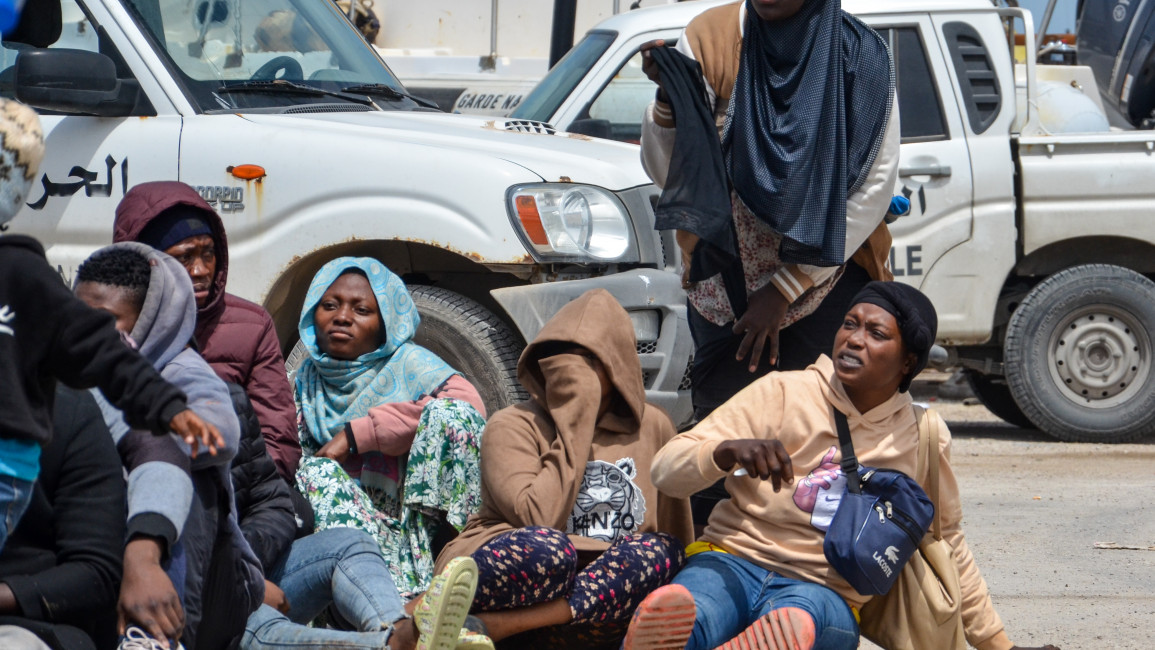Tunisia evacuates homeless migrants from coastal Sfax as boat arrival to Italy surges
Tunisian authorities evacuated hundreds of homeless sub-Saharan migrants from the coastal city of Sfax, forcefully transferring them to remote areas in the latest crackdown in the North African country.
On Sunday, 17 September, Sfax security forces evacuated the square of Bab Al-Jebli, where some 500 migrants have lived since they were kicked out of their houses in July clashes.
"They were dispersed in small groups towards rural areas and other towns," Romdhan Ben Amor, the spokesperson of Tunisia's Forum for Economic and Social Rights (FTDES), told The New Arab.
The evacuation occurred two days after the Tunisian Red Crescent was reportedly restricted from distributing emergency food and water supplies to hundreds of migrants, refugees and asylum seekers in the city.
Tunisian Red Crescent has yet to comment on the report.
Tunisian state news agency said authorities took the evacuation decision upon Sfax residents' request but did not articulate further on the fate of the evacuated migrants.
In July, clashes erupted between the residents of Sfax and around 17,000 sub-Saharan migrants living in the central-eastern city, which is a crucial departure point for many migrant boat crossings to Italy and Europe.
Amid the tensions, hundreds of black migrants were kicked out of their rents. Others escaped their places, fearing mobs, angry residents' attacks and police arrests.
While some left for the capital Tunis, a relatively safer city from deportation buses, others chose to stay at Sfax, hoping to secure as soon as possible a place in a boat leaving for Italy - "the best way out from Saied's racist state," argues Omar, a migrant from Sierra Lione, living in Sfax.
However, as ties between Italian PM minister Giorgia Meloni and President Saied grow stronger, "escaping Tunisia became more of an impossible mission," said a migrant in an interview with TNA.
On Saturday, Tunisian authorities arrested 200 migrants "who were preparing to make the clandestine boat trip" towards Europe, according to an official press release.
Tunisian authorities' new crackdown on "irregular" migrants coincides with the latest surge of migrant boats crossing to the Italian island of Lampedusa.
More than 120 small boats arrived in Lampedusa in roughly 24 hours, bringing the number of people at the local reception centre to 7,000 at one point. That's 15 times its capacity and more than the island's full-time population.
In July, the EU and Tunisia signed a memorandum of understanding for a "strategic and comprehensive partnership" on "irregular migration" and economic development, brushing over the migrants' crisis at the Tunisian borders.
Humanitarian sources say that at least 2,000 sub-Saharan Africans were expelled or forcibly transferred by Tunisian security forces to desert regions bordering Libya and Algeria.
At least 27 people died, and 73 others were listed as missing after being expelled into desert areas bordering Libya in July.
On 10 August, Tripoli and Tunis decided to share responsibility for providing shelter for the migrants.
Hundreds of migrants were consequently sent back to the infamous Libyan detention centres, known for their terrible conditions and incidents of violence and a place many of these migrants had escaped from already.
Since President Kais Saied's "incendiary" speech in February, racial tensions and xenophobic attacks flared in Tunisia.
He alleged that "hordes" of illegal migrants were causing crime and posing a demographic threat to the North African country.
The Tunisia-EU MoU's text did not guarantee rights or protection for the Sub-Saharan migrants living in Tunisia who have been pledging for the West's help since Kais Saied's infamous speech.
The EU has so far remained silent on Tunisia's treatment of Sub-Saharan migrants.



